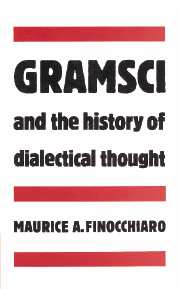Book contents
- Frontmatter
- Contents
- Preface and acknowledgments
- INTRODUCTION: AN APPROACH TO GRAMSCI
- Chapter 1 GRAMSCI'S CROCEAN CRITIQUE OF CROCE'S PHILOSOPHY
- Chapter 2 CROCE AND THE THEORY AND PRACTICE OF CRITICISM
- Chapter 3 GRAMSCI'S METHODOLOGICAL CRITICISM OF BUKHARIN'S SOCIOLOGY
- Chapter 4 BUKHARIN AND THE THEORY AND PRACTICE OF SCIENCE
- Chapter 5 GRAMSCI'S DIALECTICAL INTERPRETATION OF MACHIAVELLI'S POLITICS
- Chapter 6 GRAMSCI'S POLITICAL TRANSLATION OF HEGELIAN-MARXIAN DIALECTIC
- Chapter 7 HEGEL AND THE THEORY AND PRACTICE OF DIALECTIC
- Chapter 8 GRAMSCI AND THE EVALUATION OF MARXISM
- CONCLUSION: DIALECTICAL METHODOLOGY AND TEXTUAL CRITICISM
- Appendix: Concordance of critical edition and English translations
- Notes
- Bibliography
- Index
Preface and acknowledgments
Published online by Cambridge University Press: 10 December 2009
- Frontmatter
- Contents
- Preface and acknowledgments
- INTRODUCTION: AN APPROACH TO GRAMSCI
- Chapter 1 GRAMSCI'S CROCEAN CRITIQUE OF CROCE'S PHILOSOPHY
- Chapter 2 CROCE AND THE THEORY AND PRACTICE OF CRITICISM
- Chapter 3 GRAMSCI'S METHODOLOGICAL CRITICISM OF BUKHARIN'S SOCIOLOGY
- Chapter 4 BUKHARIN AND THE THEORY AND PRACTICE OF SCIENCE
- Chapter 5 GRAMSCI'S DIALECTICAL INTERPRETATION OF MACHIAVELLI'S POLITICS
- Chapter 6 GRAMSCI'S POLITICAL TRANSLATION OF HEGELIAN-MARXIAN DIALECTIC
- Chapter 7 HEGEL AND THE THEORY AND PRACTICE OF DIALECTIC
- Chapter 8 GRAMSCI AND THE EVALUATION OF MARXISM
- CONCLUSION: DIALECTICAL METHODOLOGY AND TEXTUAL CRITICISM
- Appendix: Concordance of critical edition and English translations
- Notes
- Bibliography
- Index
Summary
In preparing an earlier work on the epistemology and methodology of the history of science (History of Science as Explanation, 1973), I found useful some of Benedetto Croce's ideas on the philosophy of history in general, when I applied them to the situation in the historiography of science. This got me interested in a deeper understanding and criticism of Croce, and in the pursuit of this new interest it was inevitable that I would come across Antonio Gramsci's Historical Materialism and the Philosophy of Benedetto Croce. I was so impressed by that volume that I felt the need for a more systematic study of Gramsci.
My concern with this seminal thinker was reinforced via another route. This additional connection was provided by what I had learned while working on a book dealing with logic and scientific method (Galileo and the Art of Reasoning, 1980). Because the theoretical lessons in this work of mine were grounded on a critical analysis of Galileo Galilei's Dialogue on the Two Chief World Systems, my investigation forced me to face and to overcome a number of crucial issues in the theory and practice of textual interpretation, and it led to a number of conclusions in general scientific methodology. Thus, as I was beginning to discover Gramsci's Prison Notebooks by the other route, I was also beginning to feel that my epistemological and hermeneutical experience with a classic of past physical science would be helpful in the epistemological use and critical interpretation of this modern classic in social and political theory.
- Type
- Chapter
- Information
- Gramsci and the History of Dialectical Thought , pp. ix - xiiPublisher: Cambridge University PressPrint publication year: 1989

